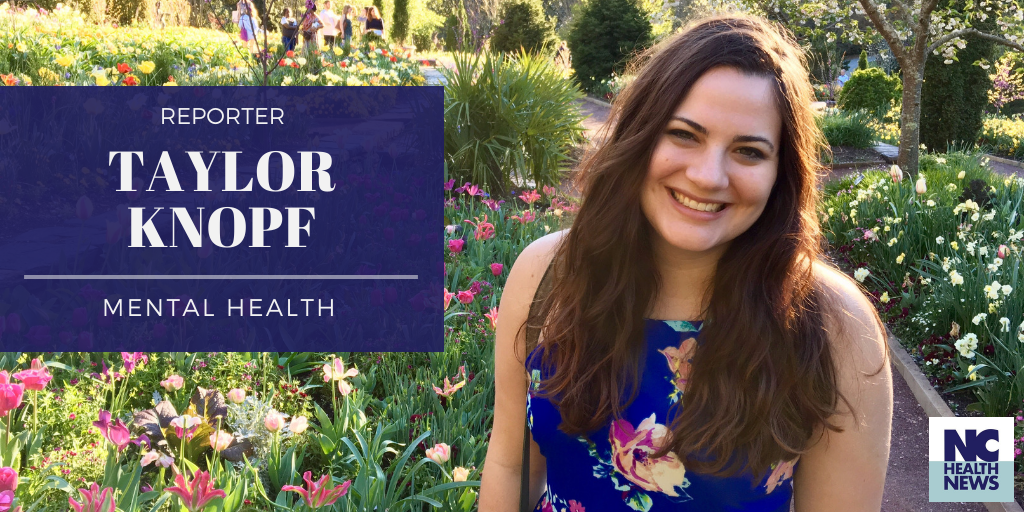By Eric Frederick, NC Local newsletter editor
[Also in the Dec. 2 edition: Sign up for the first NC Local News Summit, resources and tips for covering COVID-19’s surge, and try out a new national map of Black community media]
This one starts with a European vacation that turned into work. Along the way are impromptu train rides, weeks of nausea and naps on the floor. It ends with a prestigious award — and maybe, just maybe, some changing perceptions.
The protagonist is reporter Taylor Knopf. I worked with her for a minute when I was the interim political editor at The News & Observer in 2016, before she moved on to cover mental health for founder and editor Rose Hoban at the nonprofit North Carolina Health News. After learning that Knopf had won a first-place AHCJ Award for Excellence in Health Care Journalism for her six-part series called Lessons From Abroad, I called her to get the backstory.
It starts in 2018. I’ll let her tell it:
————
I had booked these tickets to Paris for Andy and me, just as a vacation to get away. (Andy is her husband, Andy Specht, the PolitiFact NC reporter at WRAL.) A couple of months later Rose comes to the group and says, “Hey, we have this opportunity to get a last-minute Solutions Journalism grant.”
I had recently read a story in, I think, the Atlantic, about a drug consumption room or a safe injection site in Paris. And I thought, we’re going to Paris, maybe I could stop by there — I mean, that’s a solution that we don’t have here in the United States to the opioid problem. And I was probably the main person writing about opioids for North Carolina Health News. So I proposed to Rose … I could tack a day or two onto my trip and visit this.
(Eric here. Hoban told me that her reaction was: “Are you sure you want to do this on your vacation?” Well, she was. With only a few days to write a proposal, Knopf hopped on the phone.)
I had to start making contacts in Europe in the harm reduction community, and that’s kind of hard to do because I don’t know anybody over there, right? And there’s the language barrier. So I started with, I think it was somebody who used to work at WUNC who knew somebody who worked in England who knew somebody who worked in Paris. So it was this chain of people, and finally, they said, “You know who’s really at the forefront of harm reduction in Europe? It’s Switzerland. And here’s the guy who’s really leading the effort.” So I start talking to this guy in Switzerland on the phone, and he just had all these great ideas for people I could talk to there.
And then I heard about heroin assisted treatment there … and he’s like, “By the way, it’s only a six-hour train ride from Paris.” So I made this grant proposal that had started with, “Hey, I’ll just drop by a Paris drug consumption room” to this elaborate four-city tour in Europe that spans the course of 10 days.
(She got the grant, changed her itinerary, and left for France a week earlier than planned, alone — to report on harm reduction programs in Paris and Bordeaux.)
And then Andy flew into Paris … and we immediately boarded the train and went to Switzerland, and the first two to three days were actually just me working and Andy carrying my stuff and taking photos … I mean, I took Andy into a heroin assisted treatment facility when people were literally injecting in the room next to us. We got coffee with a heroin patient afterward, and that was our evening that day. Andy was a really good sport about it all, and I think he found it super interesting, too, as another reporter.
(The actual vacation followed — hiking in the Alps, visiting family in Germany, and back to Paris. And then…)
The last few days of the trip, I started to feel sicker and sicker, and the trains were starting to get to me, like motion sickness. And the very last night in Paris, I vomited all night. Just barely could make the flight the next day because I’d been up all night sick. And I was like, wow, maybe this has all just gotten to me, all this traveling and time change, and I’d really poured myself into the trip, so I thought I was just making myself sick. But as soon as I got home, I checked the calendar and I was like, ooh — actually, this could be something else.
(And it was. It was their son, Theo, who was born the following summer, and is most definitely something else.)
And then, obviously, I had to start writing. I had to piece together all of the video, photo, and audio, everything, and I was so sick. I took naps on the floor in between writing. But it paid off.
(The photo above, showing Knopf interviewing Thilo Beck, the head psychiatrist at a heroin treatment facility in Zürich, was taken by Specht — who may or may not have a future on the visual side, if he grows tired of all that fact checking.)
The reverb
Knopf said she’s heard from people throughout the country, from doctoral students to the State Department — but “the most we can ask for is the start of a conversation around these harm reduction methods that are currently illegal in the United States.”
The award — first place in the Public Health (small) category of the Awards for Excellence in Health Care Journalism competition, held by the Association of Health Care Journalists — is the first AHCJ award for NC Health News. A look at the other winners will tell you what kind of company Knopf is in.
“I have been entering AHCJ contests 15 years and never won a damn thing,” Hoban, who edited the series, told me — “and here, on her first go, she wins a … first place. I nearly lost all of my best buttons! I’m so proud of her.”
[Read Knopf’s tips for reporting such a project.]
[Find out more about Solutions Journalism, including available training.]




